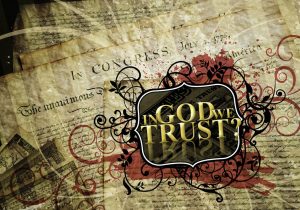on disestablishing the secular church
Writing in a recent edition of Touchstone magazine, James Hitchcock[1] thoughtfully illustrated and acknowledged the effective establishment of a state religion, notwithstanding it expressed prohibition by the First Amendment to the U. S. Constitution.[2]

In God We Trust?
Hitchcock begins with the observation first made by the great historian Christopher Dawson that every culture has a religion at its core, a claim that has been borne out by virtually all empirical studies. The rise in influence of secularism in American culture was first taken up by the Supreme Court in 1947 but as Hitchcock asserts the actual secularization of the culture only began its rapid ascendency sometime after 1965.
While for the first time in history there might appear to be religion-less societies, he contends that to be “at best premature, because modern Western secularism is not the absence of religion, as many religious believers fear, but something far worse: secularism is itself a religion, carrying forward the realization of the Enlightenment, of Communism, and of Fascism that the decline of traditional religions leaves a void that has to be filled, although this new secularist religion has a disarming simplicity, devoid of holy days, hymns, and catechisms (but not of saints).”
He further adds that “Secular liberalism is a religion in that it offers a comprehensive vision that supersedes all others—enlightened people using the power of the state to eradicate injustice in the world and to build the ideal society. It is a dream with an appeal so powerful that it is always in danger of veering into what Dawson called ‘soft totalitarianism.’ Countless numbers of government agencies promote it in innumerable ways. The sphere of ‘privacy’ in which people can live independent of government gets narrower and narrower. The autonomy of the family is restricted. … The newly emboldened secularist faith attempts to persuade people that traditional Christian moral beliefs are narrow and inhumane and that secularism offers liberation from those irksome restraints. … Secular liberals are hostile to orthodox religion in part because such religion is a potential distraction from the liberal vision, if not in the crude Marxist sense of being the opiate of the people, then at least in diluting the application of religious fervor to worldly tasks”
But if secular liberalism is a religion where is its church? The answer lies squarely in the university, “an institution originally founded on religious belief in the traditional sense but where such belief has long been marginalized and even made the victim of direct hostility. It is particularly in the universities that the fallacy of pluralism is obvious, where the venerable liberal idea of tolerance and open-mindedness is now denied. The universities produce the magisterial authorities of the secular religion, whose pronouncements govern much of the world of politics, communications, and social work in the broadest sense.”
Hitchcock concludes by noting that “The religion of secular liberalism in now in effect ‘established,’ in the American constitutional sense of the word.” He strongly asserts that secular liberalism is not in the least ecumenical, as shown by its adherent’s open display of contempt, even hatred for orthodox believers. Secularists believe they have won the debate and are now claiming the privileges of their establishment.
[1] James Hitchcock, Professor Emeritus of History at St. Louis University in St. Louis. His books include History of the Catholic Church: From the Apostolic Age to the Third Millennium (Ignatius Press) and the two-volume work, The Supreme Court and Religion in American Life (Princeton University Press).
[2] James Hitchcock, Idols of the State, Touchstone: A Journal of Mere Christianity, January/February 2016, pp. 24-27.
